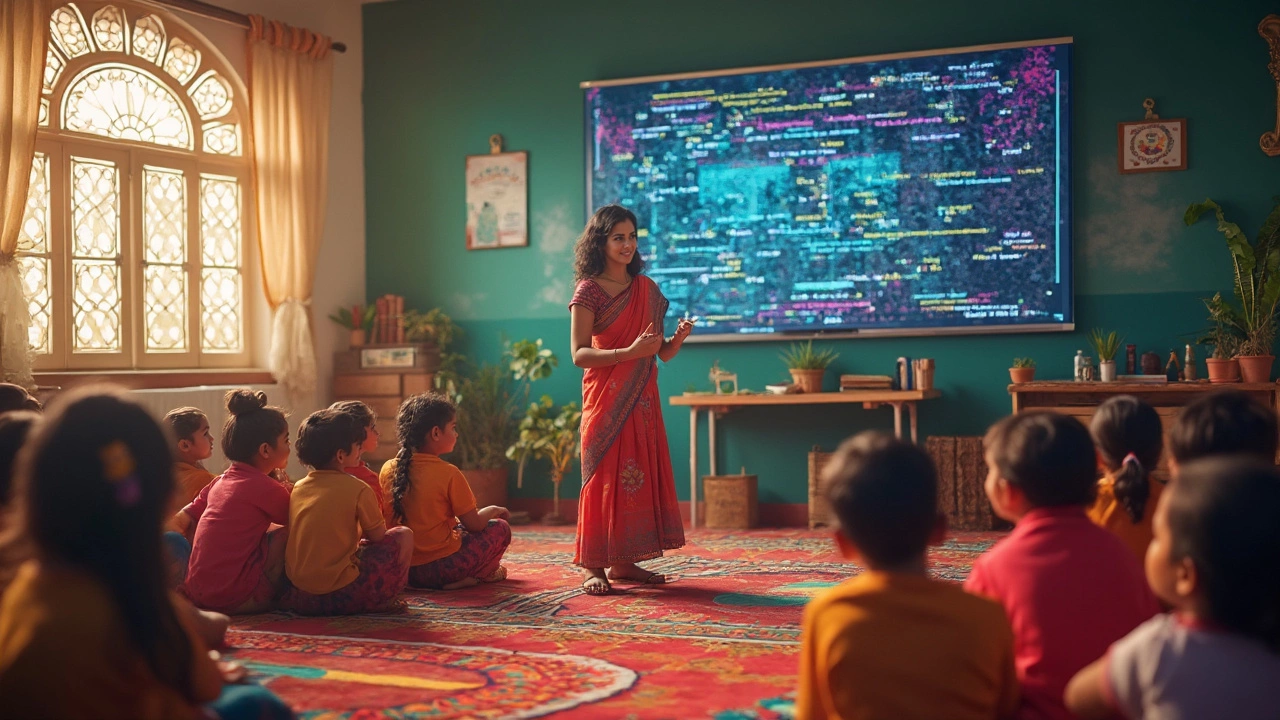Many people have this perception that to thrive in coding, you have to be some kind of math genius. It's a common belief that can be a bit intimidating, especially for individuals who don't count math as their favorite subject. But let's take a moment to unravel this assumption.
Coding is fundamentally about solving problems and creating solutions. While math might play a role in specific fields, like algorithm design or data analysis, the majority of coding tasks tap more into your ability to think logically and creatively. You don't need to know calculus to build a website or create an app, and that's a fact worth highlighting.
As technology becomes more embedded in our lives, coding languages have evolved to be more user-friendly, making it easier for everyone to learn programming, regardless of their math backgrounds. So, don't let a fear of math stop you from trying your hand at coding! Instead, focus on sharpening your logical thinking, which is the key to becoming an effective coder.
- The Intersection of Math and Coding
- Unlocking the Power of Logical Thinking
- Learning to Code Without Advanced Math
- Tools and Languages for Every Skill Level
- Tips for Aspiring Coders
The Intersection of Math and Coding
Math and coding share a fascinating relationship, where math often provides the tools necessary for complex problem-solving, but coding transcends the realm of numbers to include creative and logical thinking. To start, let's tackle the myth that math prowess directly equates to programming proficiency. While certain programming tasks, such as developing complex algorithms or engaging in data science, require a mathematical foundation, the core of coding relies much more on abstract thinking, pattern recognition, and logical structuring. In fact, many seasoned coders assure us that their day-to-day tasks heavily involve reasoning through problems rather than performing complex arithmetic calculations.
One might argue that the essence of coding lies in breaking down large tasks into smaller, manageable pieces—a skill akin to mathematics but not limited to numerical manipulation. As software development expands its horizons with domains like web development and user interface design, math takes a backseat, while creativity and user-centered approaches steer the wheel. Coding classes often highlight these aspects, making them attractive to those who might have previously shied away due to math anxiety. Acknowledge software like Scratch, which facilitates beginners to learn fundamental coding concepts without daunting mathematical terminologies, further bridging the gap between the two fields.
In many educational methodologies, educators increasingly recognize the importance of teaching students how to 'think like a programmer' rather than solely focusing on mathematical competence. This approach emphasizes problem-solving skills and learning from failure, which proves invaluable in both programming and life. Renowned computer scientist Donald Knuth once said, “A recipe is a program; just remember a program must not only give the process for solving a problem, but it should solve it in a reasonable and efficient way.”
Here, Knuth underscores coding as a pragmatic discipline where logic and efficiency, rather than pure math, are paramount.Yet, do not misconstrue this as math having no place in coding.
For those aspiring to dive into fields like cryptography or artificial intelligence, a strong grasp of math skills can indeed be a powerful asset. Here, algorithms hinge on mathematical theories to build secure systems and develop learning models; however, these areas are not representative of the totality of the coding world. Tools like Python and R offer libraries that perform intricate mathematical operations, liberating programmers from manually scripting every line. As a matter of fact, according to a survey by Stack Overflow, only a small fraction of developers reported using advanced math on a routine basis, contrasting the heavy reliance on frameworks, libraries, and APIs.
To sum up, while math offers incredible precision and depth to various aspects of coding, the two are distinct realms unified by the human endeavor to solve complex problems. Those participating in coding classes should not be daunted by the perceived necessity for high-level math, but rather be encouraged to leverage their logical intuition and enthusiasm for technology. With persistence, any aspiring coder can flourish without the constant use of advanced mathematics, finding their niche within the diverse expanse of programming and its numerous applications.
Unlocking the Power of Logical Thinking
Logical thinking is a cornerstone of effective coding. At its core, it's about reasoning and making well-thought-out decisions that lead to solutions. When diving into the world of programming, being able to break down complex problems into manageable steps becomes invaluable. This is because coding is quite similar to problem-solving in daily life—it's about finding the root of the problem and coming up with a roadmap to solve it. This skill transcends the need for deep math skills and instead relies on your ability to comprehend and simplify issues.
Let's consider the fact that many coding practices today draw parallels to puzzles, requiring a mindset that is both analytical and creative. Through logical thinking, you'll find patterns, predict trends, and make assumptions that can be tested through your code—essentially a reflection of how all scientific endeavours operate. Remember the famous quote by Steve Jobs, "Everybody in this country should learn how to program a computer... because it teaches you how to think." This sentiment captures how programming fosters a discipline of structured thinking, thereby enhancing your logical faculties in numerous ways.
An interesting aspect of this is the influence of logical thinking on debugging—a critical part of the coding process. Here, logic is your ally. By tracing your steps or rethinking the sequence of commands, you can identify where the program deviates from expected behavior. As most programmers will attest, bugs can be notoriously complex, requiring a clear-headed approach to identify subtle errors in syntax or logic. Good logical thinking helps you remain methodical and patient, enabling you to approach these situations with clarity and confidence. It's not just about finding the error, but understanding why it happens—an enquiry that is rooted firmly in logic.
Various studies have highlighted that individuals with solid logical thinking capabilities often outperform their peers in programming tasks. This is partly due to their enhanced problem-solving skills and the ability to envisage the final product from an abstract idea. The art of programming is not just about writing lines of code; it's about creating a cohesive architecture where each component fits seamlessly within the broader system. This requires the programmer to chart a flow that is both logical and efficient, a feat best achieved through refined logical thinking.
To nurture this vital skill, aspiring coders should engage in activities that challenge their mental patterns. Think of logic puzzles, brain teasers, or even board games like chess that require strategic planning. These activities stimulate your brain, encouraging it to form fresh neural pathways geared towards logical processing. In addition to boosting your reasoning skills, they can open up new ways of approaching problems by teaching you to anticipate and react before hurdles can become roadblocks. In your coding journey, having this flexibility in thinking can be a game-changer, propelling you forward in ways you might not have initially considered.

Learning to Code Without Advanced Math
The prospect of diving into coding can naturally lead to anxiety if you feel your math skills are not up to par. Yet, the good news is, you don't need to be a math wizard to excel at coding. Thanks to the evolution of programming languages, many strategies and tools are available to help individuals code effectively without needing advanced math. The focus more on logical structures and problem-solving abilities rather than complex equations. In fact, the most successful programmers often draw from a wide range of skills and knowledge, extending beyond mathematical acumen.
Languages like Python and JavaScript have been designed to be intuitive and accessible, often compared to English in their readability. They don’t require you to navigate through arcane symbols or formulas. Python, for instance, is used for everything from web development to data science because it's readable and versatile. Even if you're just starting out, you can work on meaningful projects quickly. When coding in Python, what matters most is understanding the flow of data and the ability to structure information logically, rather than computing intricate numerical problems.
Steve Jobs once said,
“I think everybody in this country should learn how to program a computer, because it teaches you how to think.”This statement underlines the balance between technical and creative thinking required in coding. The emphasis on problem-solving can lead to greater innovations than mastering high-level calculus or statistics. In essence, coding challenges you to think critically, to break down problems into smaller, manageable parts, and to devise innovative solutions, regardless of the level of your math skills.
Moreover, the tech landscape has matured to a point where visual coding tools can also assist those who may struggle with traditional line-by-line programming. Platforms like Scratch offer a block-based coding system that enables users to create interactive stories, games, and animations, without ever touching a line of code. This visual approach helps stimulate logical thinking skills and provides a solid foundation for understanding the core principles of programming, readying learners for more complex projects when they decide to move on to traditional coding.
Another factor to consider is the extensive support network available to budding coders. Online forums, coding bootcamps, and communities provide environments conducive to learning coding in the absence of strong math skills. Platforms like Stack Overflow and GitHub contain a wealth of knowledge and solutions contributed by a diverse global community, making coding more approachable. These resources build a collaborative space that demystifies programming, and enables knowledge and skills to be shared freely among coders of all levels.
It's no secret that the field of programming is fast-paced and constantly evolving. New tools and frameworks are developed regularly, and many of these innovations are aimed at making coding more accessible and easier to learn. This democratization of coding means that your detours around advanced math don't hinder you from achieving mastery in programming. By keeping abreast of the latest in coding technology and expanding your learning methods, you can excel in the coding world both creatively and effectively.
Tools and Languages for Every Skill Level
When you're embarking on a journey toward becoming a programmer, the first thing you’ll likely encounter is a treasure trove of tools and languages. Don't let the sheer number of choices overwhelm you. It’s important to remember that some of the most powerful programming languages out there are designed for accessibility, meaning developers created them so anyone at any skill level can dive right in and start coding. These languages remove a bit of that intimidating shine from the realm of technology by putting ease of use first. For instance, Python is often touted as one of the best languages for beginners. Its simple and readable syntax makes it the ideal starting point, allowing new coders to focus more on the logic behind the code rather than tripping over complex lines.
While learning to code, it can be beneficial to align your choice of language with the type of projects you're interested in creating. Say, for example, you're captivated by the idea of web development. In this case, HTML, CSS, and JavaScript should be your best friends. These languages form the backbone of most websites you see today. If you're aiming for something a little more on the data side—maybe data science or machine learning—R and Python are immensely popular in these fields. They offer libraries that can handle data manipulation tasks with ease, which is why industries rely heavily on them.
Aside from languages, there are also fantastic tools designed to support coders at any level. Integrated Development Environments (IDEs), like Visual Studio Code or PyCharm, streamline the coding process with features that help catch errors before you even run your program. In recent years, browser-based platforms like Repl.it have become reasonable options as well. These don't require any installation—they run right from your browser window, letting you practice coding anywhere, anytime. Speaking of convenience, GitHub is the place to be when it comes to collaboration and learning from others. It is a precious repository of code and projects contributed by millions worldwide. As a beginner, you can fork a project or contribute to open-source, learning the ropes as you work with experienced coders.
"You don’t have to be a software programmer to use programming languages," developers often say. Steve Jobs famously noted, "Everyone should learn how to code, it teaches you how to think." Coding is less about the language itself and more about acquiring the mindset necessary to tackle and solve technical problems. Each language or tool you master adds a new skill to your coder's toolbox. So fear not if you feel stuck at times; every bit of struggle here is a stepping stone toward proficiency.

Tips for Aspiring Coders
Starting your coding journey can seem daunting, especially with all the available information and diverse opinions on what tools or languages to learn first. To begin with, it's important to realize that coding is accessible to anyone willing to invest time and effort into learning it. The prevalence of user-friendly programming languages means you don’t need extensive math skills right from the get-go. Embrace this journey as one of both logic and creativity. It's about finding patterns and thinking in an orderly fashion while allowing yourself the freedom to innovate and solve problems in unique ways.
One effective method for new coders is to start small. Tackle bite-sized projects that you can handle within a reasonable timeframe. This can involve creating a simple calculator application or building basic web pages with HTML and CSS. Whatever the project, focus on finishing what you start; each completed task boosts confidence and reinforces learning. As you advance, set progressively complex challenges to keep your skills sharp and retain your curiosity. Consider the advice of Code Academy co-founder Ryan Bubinski, who stated, "Learning to program is like learning a new language — it’s about immersion and practice."
Not all learning happens in a structured environment, and that's especially true for coding. Make use of online resources that fit best with your learning style, such as interactive coding platforms like freeCodeCamp or Codecademy, which offer structured courses that guide you from the basics to more advanced concepts. Engage with communities on forums like Stack Overflow to seek help and collaborate with fellow coders. It's here where the real-world community can offer insights and solutions you might not have considered.
Speaking of communities, pair programming is a powerful tool for new coders. By working with another coder, you’ll learn to look at problems from different angles and discuss solutions. This collaborative approach not only builds technical skills but also communication skills, which can be incredibly beneficial in professional settings. Remember, there's always multiple ways to solve a problem in coding, and embracing diverse perspectives will set you up for success.
Additionally, keep an eye on the developing tech industry to guide your learning journey. Languages and tools constantly evolve, so staying updated with current trends can offer you advantages. It's beneficial to understand which programming languages are in demand. For example, Python has gained significant traction due to its simplified syntax and efficiency, which are conducive for newcomers in fields like coding and programming.
Lastly, don't shy away from mistakes. Errors are commonplace in coding, even for seasoned developers. Each bug or broken script is an opportunity to learn, and debugging will become a regular — and fruitful — part of your life as a coder. As Steve Jobs famously mentioned, "Everyone in this country should learn how to program a computer because it teaches you how to think." Let this philosophy guide you as you weave through the intricate world of coding.




